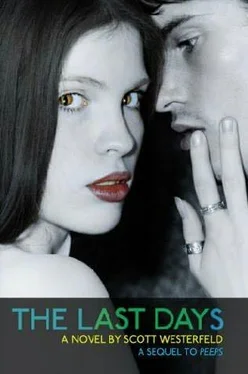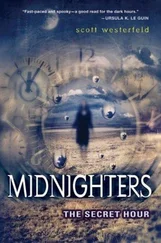And she wonders why I don’t dress up more.
Finally, though, I weaseled out of her orbit with the lame excuse of wanting to look at, you know, the art . Her fingers trailed on my shoulder as I slipped away, reminding everyone one more time that I was her daughter.
I made my way straight to a table full of champagne, rows and columns of it bubbling furiously, and smiled. The open bar: where else would a record company rep hang out at an art opening?
I snagged a glass and hovered near the table, keeping an eagle eye (just one) out for the face I’d downloaded that morning. My trap was finally set—I was ready. All my lines were memorized; I was dressed ravishingly and standing in the perfect spot. There was nothing more I could do but wait.
So I waited…
Twenty minutes later, my enthusiasm had faded.
No record company talent scout had materialized, the glass was empty, and my feet were unhappy in their new shoes. The party buzzed around me, ignoring my little black dress and borrowed bling, like I was some kind of nonentity. Bubbles rattled unpleasantly in my head.
All my life I’d wondered how my mother’s sole life purpose could be going to parties, even while the world was crumbling around her. Finally Google had shown me the answer: her reason for existence was to get me into this party. Astor Michaels, Red Rat Records’ most fawesome talent scout, was also the biggest collector of this photographer’s work. He’d discovered the New Sound, signing both Zombie Phoenix and Morgan’s Army—not huge, commercial bands, but gutsy bands like us.
It was a perfect match, like when Moz and I had been brought together. Surely this was fate playing with my mother’s social calendar.
But as I picked up my second glass and wandered through the crowd, squinting at two hundred half-blurry faces and recognizing none of them, I started to consider an awful possibility: could fate be messing with me ?
What if Astor Michaels was out of town? Or busy scouting bands at some undiscovered club instead of here? What if Google had lied to me? All my efforts tonight would be wasted—in fact, my mother’s whole life would be wasted…
I stood there, dizzy on my feet, staring at a half-empty glass and realizing something equally dismaying: the champagne gene was another one my mom hadn’t passed on. Maybe it was my half-blurry vision or the buzz of the uncaring crowd around me, but I felt like reality was in a blender.
I had to get control.
I took a deep breath and pulled myself out of the crowd, wandering to the party’s edge to look at the pictures. They were gigantic photos of the sanitation crisis: glimmering mountains of plastic bags, garbage guys on strike, lots of rats. All were dramatic and weirdly beautiful, almost life-size, as if you could walk straight into them. Which begged the question: Why would you want this stuff on your wall when it was all happening right outside?
The crowd seemed to agree. People were crowded into the middle of the room, shrinking from the images of decomposition. Only a few of us hovered at the fringes of the party, sullen and extraneous, like sophomore guys at the senior prom.
Poor art lovers , I thought, and then, in a fit of champagne-stoked genius, I realized where Astor Michaels had been hiding.
He wasn’t here for the prom; he was here for the art. He was one of the sophomores.
I started to circle the room, ignoring the crowd in the middle this time, the ones who looked well connected and happy and cool. I looked for the lonely guys, the losers.
Halfway around, I spotted him out of the corner of my eye—my good eye, luckily. He was ogling a vast photo of a shrine built by sanitation workers out in the Bronx: praying hands and crosses and skulls ( again! ) all jumbled up to provide protection on their route.
I took a deep drink of champagne to steady myself, my lines beginning to tumble through my head.
“What am I listening to? Oh, just this lateral new band.”
My fingers fumbled with the sticky clasp of my new handbag, scrambling around inside until they found my music player at the very bottom. Its earphones were non-helpfully tangled with makeup and hair goo and a million other things I never normally carried. After long seconds of unwinding, I managed to drag the player out and get the phones into my ears. But where was my neck strap? I peered down into the bottomless handbag in horror, realizing I hadn’t brought it.
I flashed back to my hours spent at the Apple store looking for just the right strap: sleek black leather with a shiny steel USB connector. I could see it in my mind’s eye, still in its packaging, sitting on my bed with all the other crap .
And of course this stupid cocktail dress, like all stupid cocktail dresses, had no pockets. It would look way too obvious just carrying the music player in my hand, and a pair of earphones snaking out from my handbag wasn’t going to make me look like the hip young trendsetter I was supposed to be. The kind who says things like…
“No, they’re not signed. Everyone just knows about them.”
I squeezed my eyes shut, trying to think.
There was only one place to put it.
I took a gulp of champagne, switched the music player on, and dropped it down my cleavage. It fit perfectly and was kind of warm down there. Really warm—I looked down and realized that while scrabbling in my handbag I’d locked the screen backlight on.
Framed by the black velvet of my dress, my breasts glowed softly blue.
In my champagne haze, it was kind of cool looking. Carrying your music this way might not be the Taj Mahal of class, but it was definitely going to get the guy’s attention.
I moved closer.
“What language is she singing in? I don’t think it is one, really.”
The player was set to shuffle our four best songs— long, intense rants of Minerva’s peppered with Moz’s cleanest, simplest lines, Alana Ray shattering it all into a thousand glittering shapes, Zahler finally playing a proper bass underneath. As I drew nearer, the music began to synchronize with the bubbles in my bloodstream, my footsteps falling with the beat. I was cool and connected, seventeen and covered with bling, a record company’s dream demographic in the flesh.
The world began to shift around me, just like when we played, my fingers twitching with the keyboard parts. Huge photographs rolled past my shoulder, a galaxy of rats’ and cats’ eyes flickering on my blurry side.
“What’s their name? I don’t think they have a name yet, actually…”
By the time I walked up beside Astor Michaels, swirling one last smidgen of champagne in the bottom of my glass, I was cool and predatory and confident, the embodiment of our music.
He turned and looked at me, his eyes following the white cords from my ears down into my glowing cleavage. His gaze flashed a little, reflecting the soft blue light.
Then Astor Michaels smiled at me, and his teeth were pointy, a hundred times sharper than Minerva’s…
All my lines flew from my head, and I pulled my earphones out, pushing them toward him with quivering hands.
“You’ve got to listen, man,” I said. “This shit is paranormal.”
About seven hundred years ago, the disease that finished the Roman Empire returned.
Humanity was already in a bad way. China had just suffered a brutal civil war, Europe had endured a destructive famine, and the Little Ice Age was descending. Across the world, temperatures dropped, crops failed, and whole countries fell into poverty. Wars were sparked by what little wealth remained.
Читать дальше












